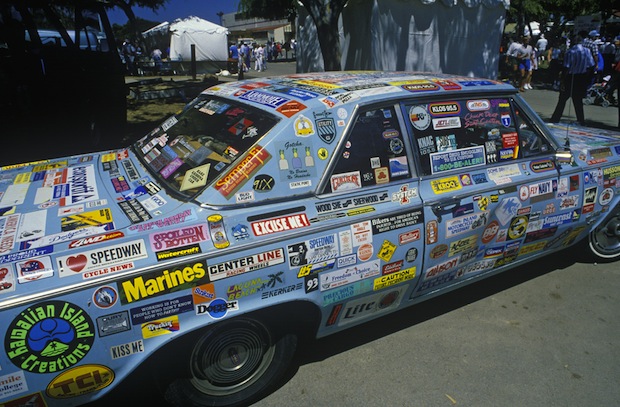With hotly contested debates and elections in the news, I recommend this piece on The Wisdom Daily about the secret ballot, reminding us that in a political culture of bumper stickers and soundbites, stepping back (from the snap decisions often engendered by those things) might make us more than just smarter voters, but genuinely happier, healthier people as well.
I want to add that this truth: Political identity, as with most any identity we claim for ourselves, is both private and public. We define ourselves not only based on internal ideas, but also in relation to others and within the larger contexts we live in.
We are social animals; everything from how we vote to what we wear are not only personal decisions, but they inform how we shape our public identities and create community. Given that, it’s not surprising when folks like to go public with more than just fashion choices, but their political opinions as well.
Go ahead and be as public as you please with your politics. Just ask yourself if your political behavior encourages or discourages others from participating…
Whether it’s a bumper sticker or a carefully chosen jacket, the choices we make tell the world something about ourselves, or at least how we want to be perceived. And given that politics isn’t about individual successes or gains, but about policies that shape the world we all share, there will be an especially public element to it. The question is how to balance our public politics with the wisdom of private voting.
For me, finding that balance begins with appreciating that none of us is our politics. Even the most politically passionate person is not fully defined by the politics they pursue. We’re all more multi-dimensional that that.
The shoes or accessories we choose in the morning are a way to message a piece of who we are. So, too, is the bumper sticker on our car, or the political conversation we decide to engage in. So go ahead and do those also! Remember though, that as important as they may be, you are not your clothes, and neither you (nor anybody else) is their politics.
In addition to appreciating the multi-faceted nature of all people we encounter, we can find balance by recalling that – even with the mostly hotly contested political issues, the ones about which we feel most compelled to go public – democracy is a long game. You win some and you lose some. But as long as people are playing, in the long run, things tend to work out.
So go ahead and be as public as you please with your politics. Just ask yourself if your political behavior encourages or discourages others from participating. Participation is the lifeblood of democracy. There’s nothing new about that, but it bears remembering when we choose to go public with our politics. Are we going for the short-term win, or aiming for both the short-term win we want AND the long-term health of the system as a whole?
As campaigns progress and the rhetoric rises, I remain a fan of both private voting and public politicking – as long as we all recall that A)? none of us is our politics, and B) long term participation is more important than any one short-term issue.
Image credit: American Spirit/Shutterstock.com

Listed for many years in Newsweek as one of America’s “50 Most Influential Rabbis” and recognized as one of our nation’s leading “Preachers and Teachers,” by Beliefnet.com, Rabbi Brad Hirschfield serves as the President of Clal–The National Jewish Center for Learning and Leadership, a training institute, think tank, and resource center nurturing religious and intellectual pluralism within the Jewish community, and the wider world, preparing people to meet the biggest challenges we face in our increasingly polarized world.
An ordained Orthodox rabbi who studied for his PhD and taught at The Jewish Theological Seminary, he has also taught the University of Pennsylvania, where he directs an ongoing seminar, and American Jewish University. Rabbi Brad regularly teaches and consults for the US Army and United States Department of Defense, religious organizations — Jewish and Christian — including United Seminary (Methodist), Yeshivat Chovevei Torah (Modern Orthodox) Luther Seminary (Lutheran), and The Jewish Theological Seminary (Conservative) — civic organizations including No Labels, Odyssey Impact, and The Aspen Institute, numerous Jewish Federations, and a variety of communal and family foundations.
Hirschfield is the author and editor of numerous books, including You Don’t Have To Be Wrong For Me To Be Right: Finding Faith Without Fanaticism, writes a column for Religion News Service, and appears regularly on TV and radio in outlets ranging from The Washington Post to Fox News Channel. He is also the founder of the Stand and See Fellowship, which brings hundreds of Christian religious leaders to Israel, preparing them to address the increasing polarization around Middle East issues — and really all currently polarizing issues at home and abroad — with six words, “It’s more complicated than we know.”

